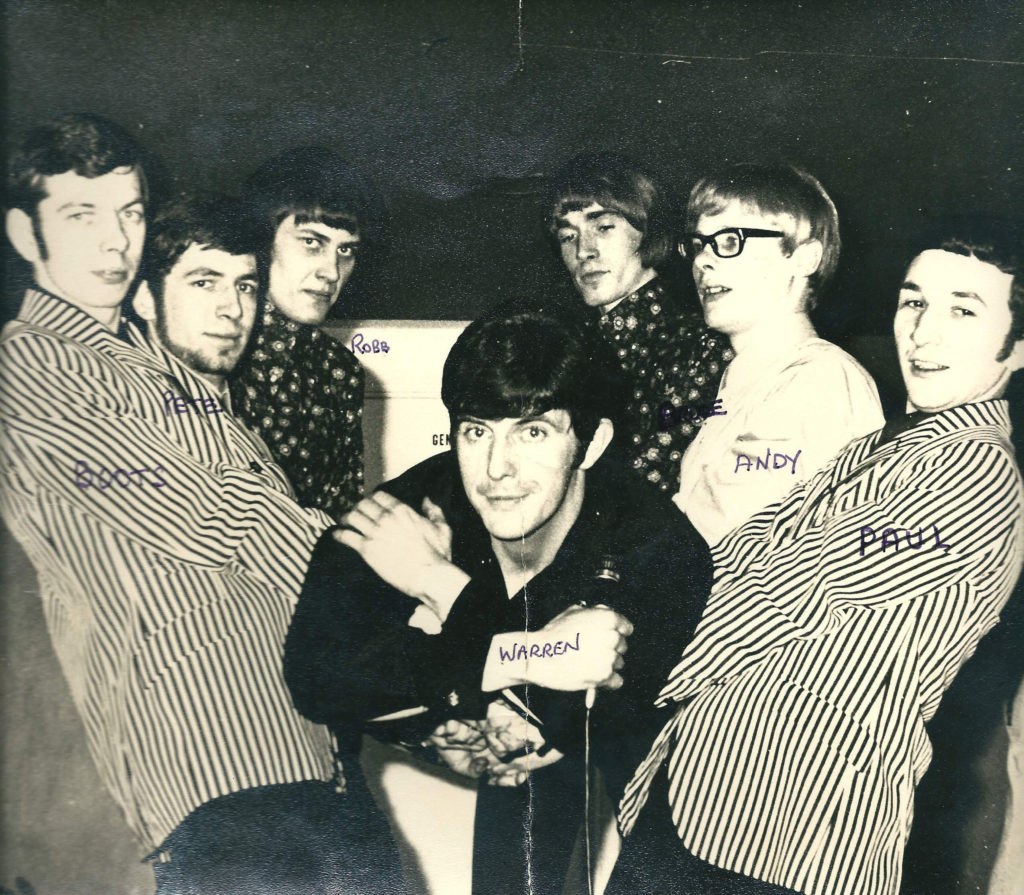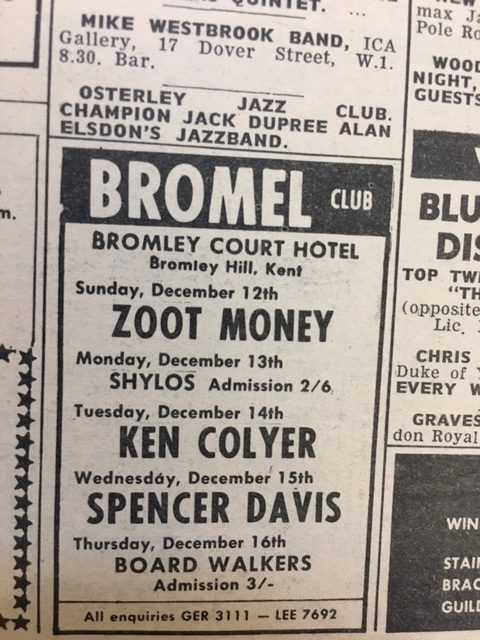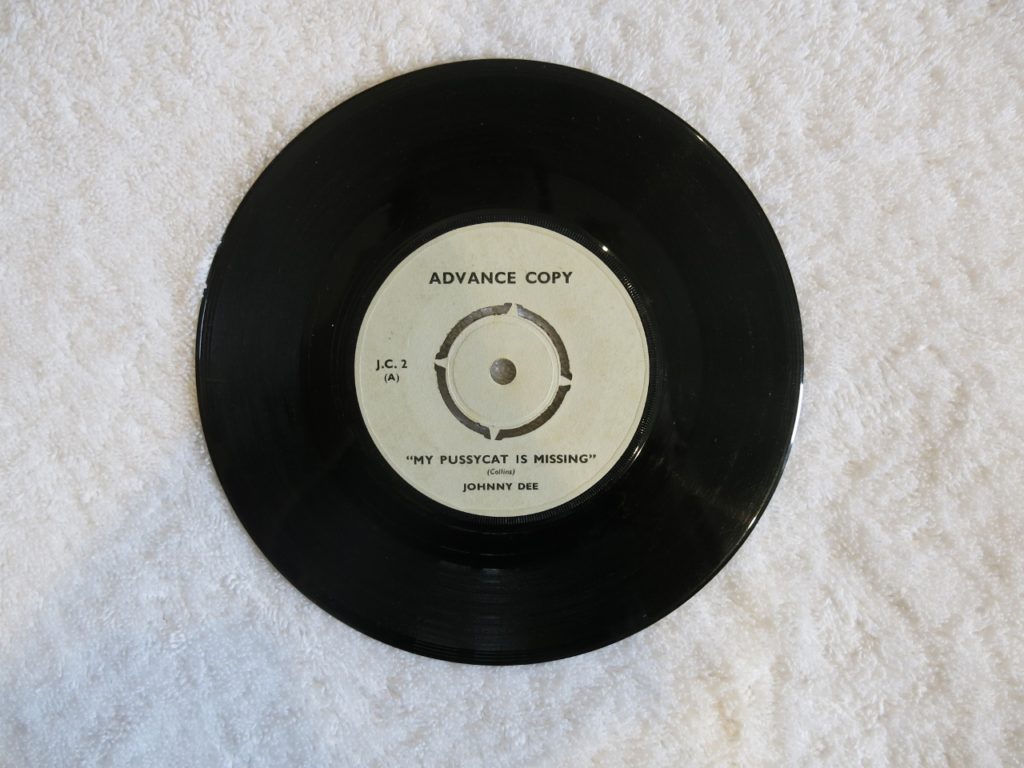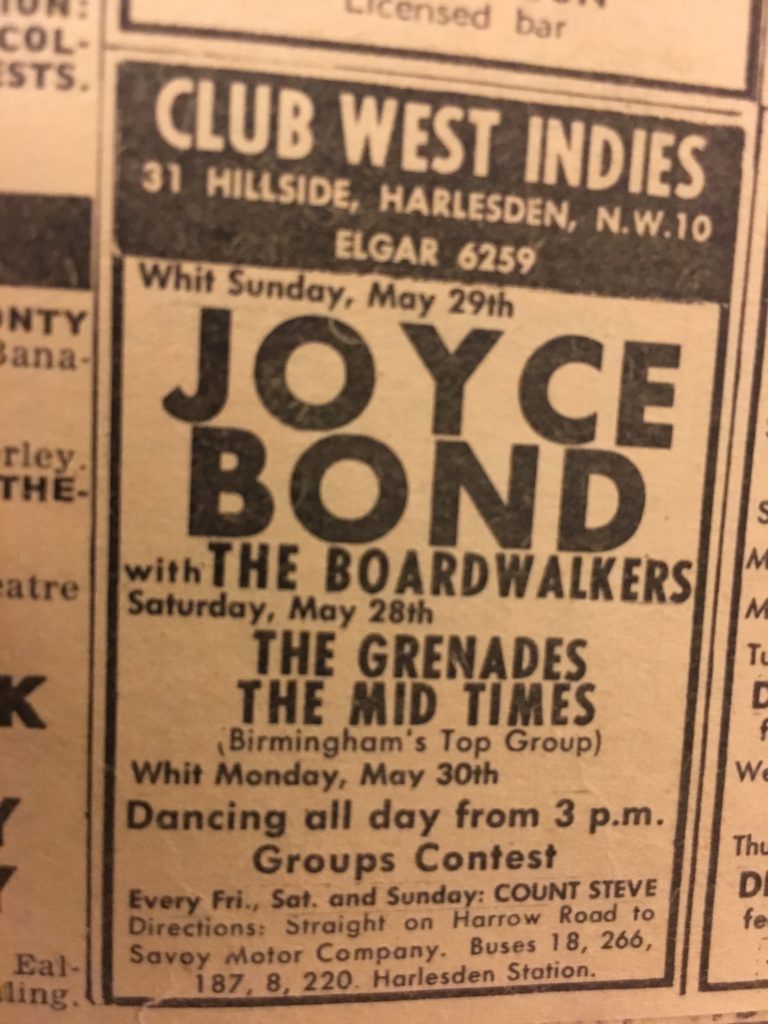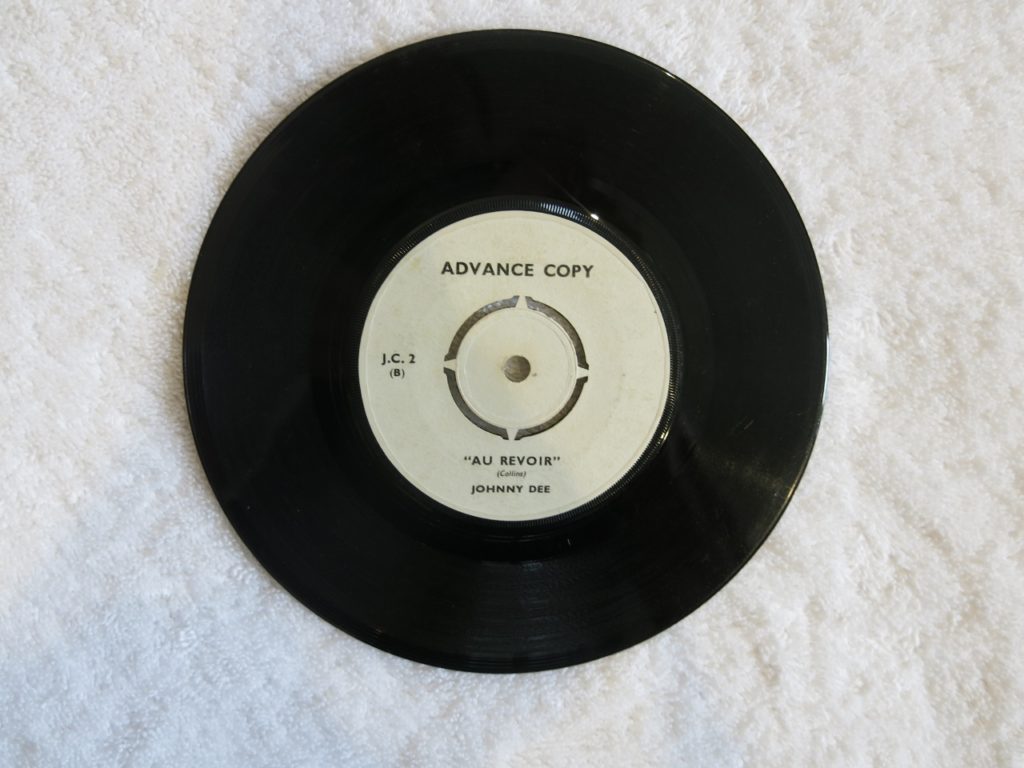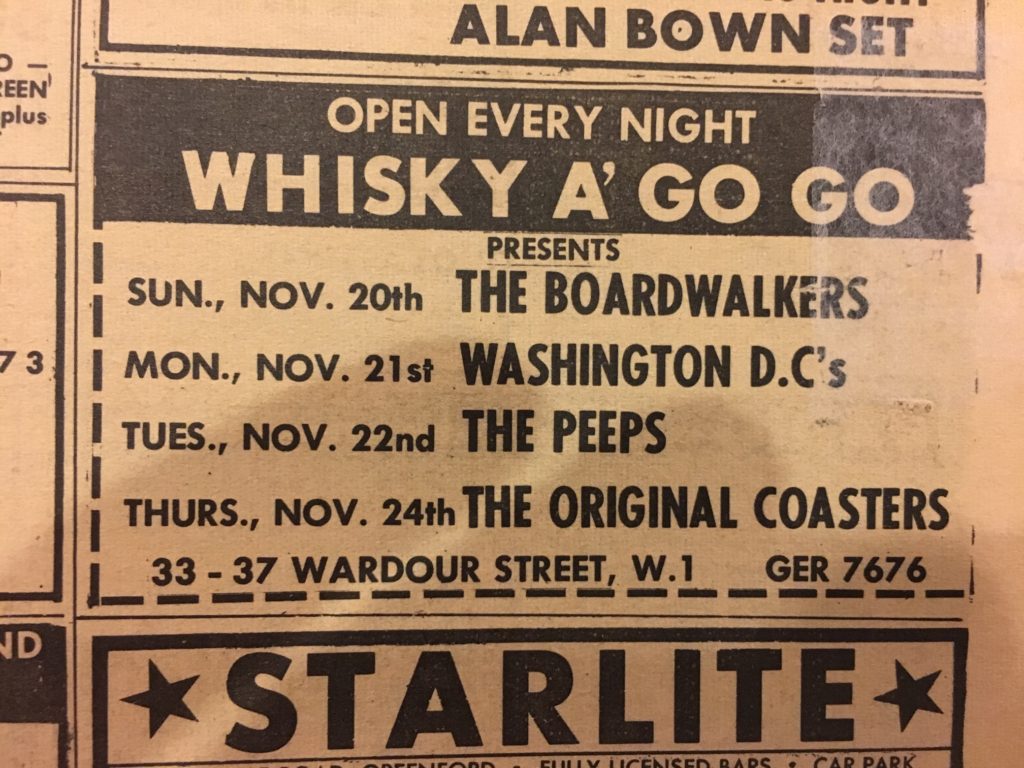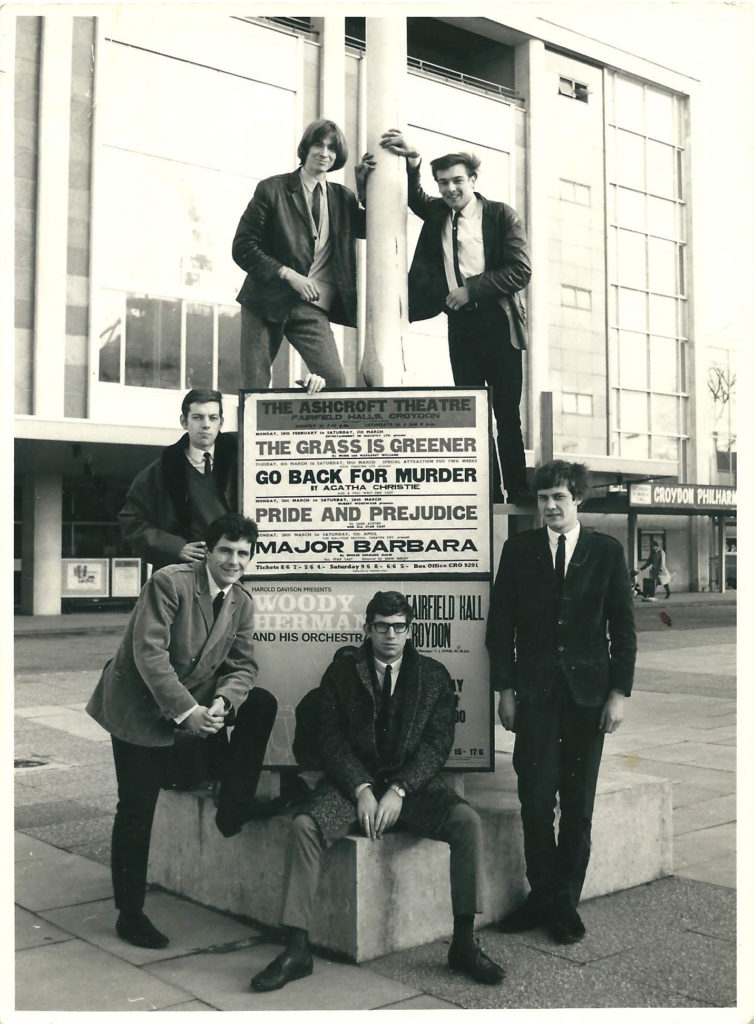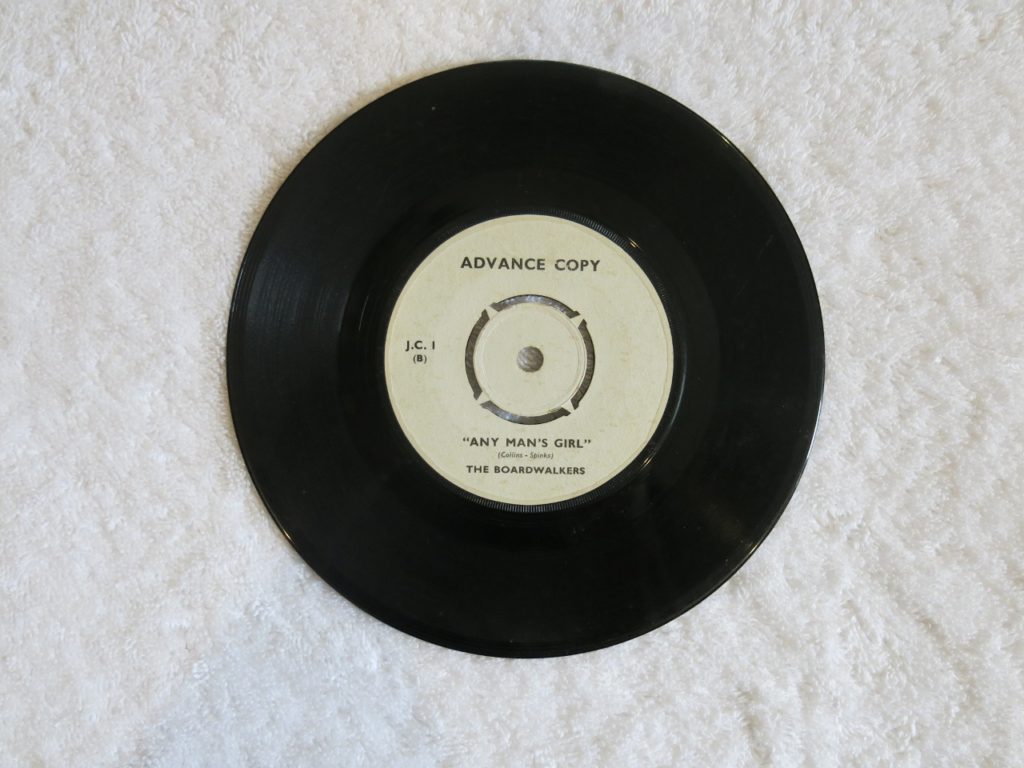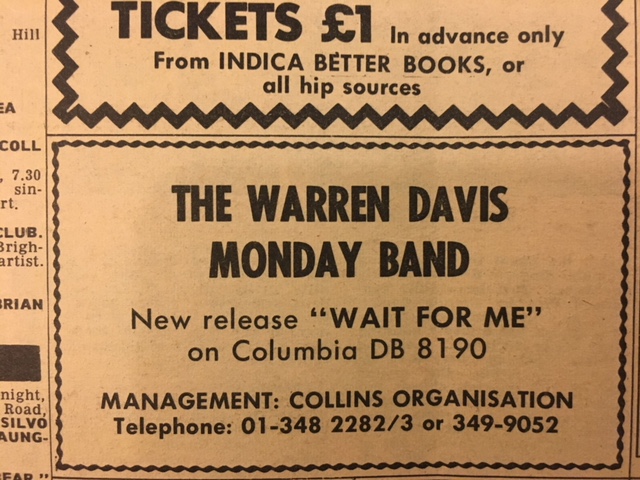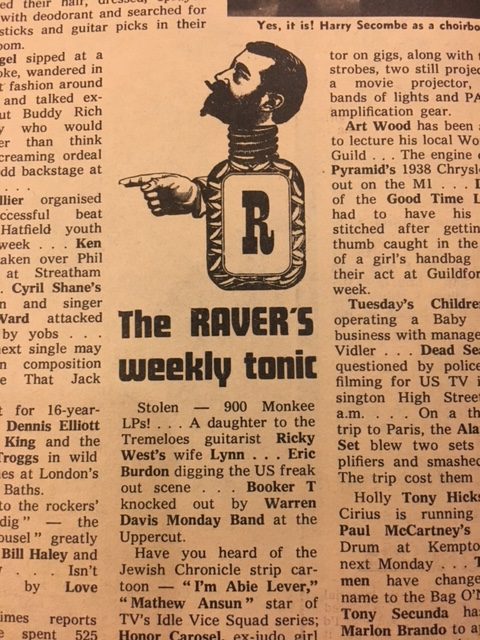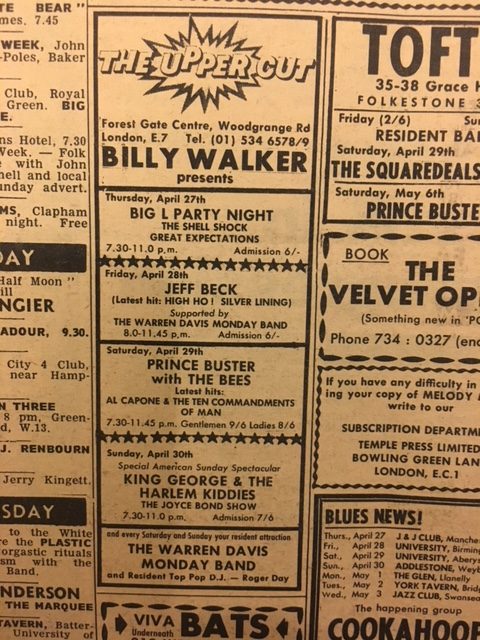By Nick Warburton
During The Warren Davis Monday Band’s short-lived career, the group were briefly associated with Rolling Stone Bill Wyman, who produced and co-wrote the A-side of their debut 45; were raved about by Hammond organist Booker T, who caught them one night in London during the spring ’67 Stax-Volt European tour; briefly included future Canadian rock legend, musician, record producer, composer, songwriter and arranger David Foster; and were the subject of a disastrous tabloid story, which reported they had signed a £500,000 contract with 20th Century Fox to make a TV series in California to compete with The Monkees.
The original Warren Davis Monday Band from early 1967. Photo: Bruce Usherwood
The one consistent thread throughout The Warren Davis Monday Band’s fascinating, yet tangled, career was former actor/model, turned singer Max Spinks (aka Warren Davis). It is his distinctive voice that links the dozen or so recordings that feature on a forthcoming CD anthology from US collectors’ label Lion Productions, which brings together pretty much everything the group cut between late 1966 and early 1968.
Max Spinks, who passed away in April 2018, began his career in Croydon in south London. Croydon (and its surrounding area) has many musical claims to fame, not least British guitar legend Jeff Beck and future Procol Harum keyboard player Matthew Fisher.
Spinks’s first notable group The Boardwalkers were formed sometime in spring 1965 and included tenor sax player Martin Grice; bass player Bruce Usherwood; drummer Pete Mole and a lead guitarist whose name no-one can recall.
The towering (literally speaking) Bruce Usherwood was a local lad from Warlingham who had previously worked with The Deltones (not to be confused with Jeff Beck’s rival group of the same name). Pete Mole meanwhile hailed from Southend-on-Sea in Essex and had worked with local bands Chris and The Confederates and The ViJays while Martin Grice was from Sutton Coldfield in the West Midlands and had moved to London with Robbie Hood and His Merrimen.
Pete Mole and Martin Grice had first met each other during 1964 when Chris and The Confederates took over a weekly residency from Grice’s group at the 2 I’s coffee bar on Old Compton Street in London’s Soho district. In the end, the two groups decided to share the gig and Mole and Grice became firm friends. When Mole later landed The Boardwalkers’ gig, he brought his friend into the fold.
In late 1965, Bruce Usherwood invited another Croydon lad, ex-The Outsiders Rob Walker to audition for the lead guitar spot and Pete Mole recruited Jon White from The ViJays to play Lowrey organ. The revised line-up began to pick up gigs at several notable north London clubs which catered for the city’s West Indian community.
“We were playing at the Club West Indies and Count Suckle’s Cue Club [near Paddington station] and suddenly we were asked if we would be the backing band for this [soul singer] Johnny Dee, whose [manager] Jeff Collins wanted to promote,” remembers Rob Walker.
Credit: Rob Walker
The Boardwalkers also backed Dee on two demo tracks (“My Pussycat is Missing” and “It’s Au Revoir”), which the guitarist still has. The recordings led to further live work, albeit with another soul singer, Joyce Bond, plus two demo recordings.
“That’s when discussion came around… [and] Jeff Collins who was wheeling and dealing as the manager for one or two of these guys suggested he manage us,” adds the guitarist.
Credit: Rob Walker
While Max Spinks appears to have done most of the hustling for gigs during this formative period, Bruce Usherwood believes Collins’s management of the band was formalised in late 1966 when The Boardwalkers played at the Whisky A Go Go on Soho’s Wardour Street, not far from Piccadilly Circus.
“Above the place where the punters went, they used to have a gambling casino and Jeff used to go up there and spend a fortune,” remembers the bass player. “One day he came and listened to the band. He said: ‘I’d like to manage you guys’ and that’s how we made the connection [with Jeff].”
One special gig that stands out in Bruce Usherwood’s memory during this period was when The Boardwalkers opened for The Yardbirds (with his old rival Jeff Beck on guitar) on Hastings Pier in East Sussex on 10 July 1966.
Walker also recalls that The Boardwalkers played some mid-week gigs at the Establishment Club on Greek Street in Soho around this time.
In March 1966, one of the few publicity shots of The Boardwalkers had been taken outside the Ashcroft Theatre in Croydon’s famous Fairfield Halls.
The Boardwalkers in Croydon, March 1966. Clockwise from top left: Bruce Usherwood, Jon White, Rob Walker, Peter Mole, Warren Davis (aka Max Spinks) and Martin Grice. Photo: Bruce Usherwood
The Boardwalkers then seized the opportunity to cut two band originals – “A Miracle” and “Any Man’s Girl”, credited to Jeff Collins and Max Spinks. Privately pressed as a white label demo, the recordings first appeared on the limited 1990s CD release Purple Heart Surgery Volume 2 but the inclusion on the forthcoming CD anthology of these two rarities is welcomed.
“Max never wrote any songs on his own,” stresses Rob Walker. “He’d have an idea and I’d add some chords, maybe a middle eight. But by the time the band had their input, we agreed that we all co-wrote them. However, not wishing to have six or seven names on the song credits, a generic ‘Max Spinks’ or [later] ‘Warren Davis’ was used.”
Interestingly, the riveting, almost-hypnotic blues-rocker “Any Man’s Girl” was later paired with “Without Fear” for a lone US release in 1967 on the 20th Century Fox Records label.
Credit: Rob Walker
Not long after the recordings were cut, Rob Walker’s old friend from Selhurst Grammar School, Paul Houlton, joined on second tenor sax. The pair had worked together previously in local outfit, Big Bully Coot’s Elastic Band alongside future New Vaudeville band bass player Neil Korner.
Significantly, the group also added Hammond organist Andy Wilson, who took over from Jon White.
With the new line-up in place, Max Spinks assumed the stage name Warren Davis and The Boardwalkers morphed in to the Monday Band.
“The name Warren Davis was completely contrived. It just sounded good,” says Rob Walker. “I bounced around a few combinations with Max at his home in West Croydon and somehow came up with the whole Warren Davis Monday Band that day. However, there was a Sunny Monday’s Tuesday Band in the UK. Later, we discovered there was a Warren Davis singer in the States, but no-one was bothered.”
Paul Houlton, however, has a slightly different take on the group’s name. “My understanding of the Monday Band came from the fact that we rehearsed at the Sandrock Hotel [in Shirley Hills, Croydon] on Monday evenings.”
In January 1967, the renamed Warren Davis Monday Band secured a massive break, landing a regular, weekly residency at the famed Whisky A Go Go in London’s West End. The British music entertainment guide, Melody Maker, lists what is possibly the band’s debut show under their new guise on 22 January 1967. The club would remain a regular fixture in The Warren Davis Monday Band’s calendar right through to their demise in the early autumn of 1968.
Surprisingly, given the incredible exposure the Whisky afforded the musicians, it wasn’t how Rolling Stone Bill Wyman got involved in writing and producing The Warren Davis Monday Band that spring.
“Because I was an acquaintance of Bill and another friend of mine, Pete Gosling, who was a good songwriter and a friend of Bill’s, we got this thing going with ‘Wait for Me’,” says Bruce Usherwood.
Interestingly, the bass player recalls that he very nearly left the band at this critical juncture. The Warren Davis Monday Band had been playing at the Cromwellian in South Kensington and The Who’s manager, Kit Lambert asked him to join another group, but, with a Columbia Records deal on the table, he declined.
With Bill Wyman behind the console, the musicians entered Regent Sound studios near Piccadilly Circus and recorded the smouldering R&B track “I Don’t Wanna Hurt You” (credited to Warren Davis).
Usherwood says the musicians had high hopes it would be issued as the lead on the first of a two-single recording deal with Columbia. However, with Bill Wyman overseeing the process and contributing “Wait for Me”, a co-write with Pete Gosling who played piano and sang with south London rivals, Moon’s Train, the band original was relegated to the B-side.
In many ways, it was a logical move. The Rolling Stone connection was there to be exploited but like other Wyman side projects, Hamilton & The Hamilton Movement, Moon’s Train and The End, it wasn’t enough to convince record buyers to go out and purchase the 45 in sufficient numbers to make it a hit record.
Although Bill Wyman was credited as producer, Rob Walker adds: “It was Jeff Collins who stumped up the money for the studio costs and then struck a deal with Columbia and paid for us to be on the Radio Caroline ‘climber of the week’.”
Of the recording session, Paul Houlton remembers that Ken Leamon, the sax player from Moon’s Train, guested on “Wait For Me”, to boost the horn section. Houlton had previously guested on Moon’s Train’s “Marriage is for Old Folks” during 1966 with a very young Peter Frampton on guitar.
According to Melody Maker, The Warren Davis Monday Band made their debut at boxer Billy Walker’s Upper Cut in Forest Gate, east London on 10 February 1967. Alongside the Whisky A Go Go, the Upper Cut would become another regular live fixture for the band and became the base the musicians would use to audition new members over the coming months.
It is where Booker T and his band The MGs heard the group in the first week of April while participating in the Stax-Volt tour, which was in London that month. Booker T was knocked out by the group’s soulful sound and raved about The Warren Davis Monday Band in Melody Maker’s “The Ravers Weekly Tonic” column, published on 8 April. The following week, the group made its debut at the renowned Marquee on Wardour Street, opening for Peter Frampton’s new band, The Herd.
However, despite the publicity surrounding Bill Wyman’s patronage of the band – he turned up at the Upper Cut on 14 May 1967 for the single’s launch – the original formation was starting to lose momentum.
After gigs at the Upper Cut opening for The Jeff Beck Group and Peter Jay’s Jaywalkers, featuring a very young Terry Reid as lead singer, longstanding member and lead guitarist Rob Walker became the first to walk away.
As Bruce Usherwood recalls, Walker was briefly replaced by a little-known Welsh guitarist and singer named Dave Edmunds, who years later would strike gold in the UK charts as a solo artist with “I Hear You Knocking” and would also work with Rockpile and dabble with an acting career.
“He was with the band [briefly] before moving on to something else [Love Sculpture],” says Bruce Usherwood.
Paul Houlton agrees and notes: “He was just a really nice guy; a fabulous guitarist and vocalist. It was a damn shame we couldn’t keep him.”
Rob Walker can add more detail: “When Dave Edmunds turned up, I did a ‘handover session’ with him and the band to familiarise him with the arrangements. Dave was only in the band for a couple of weeks. I think he was already in Love Sculpture when he joined the Monday band. When he quit, I was contacted and filled in for a couple of weeks before another replacement was found.”
Read part 2 of the The Warren Davis Monday Band feature.
Thanks to Bruce Usherwood, Rob Walker, Martin Grice, Paul Houlton, Jeff Collins and Jacomine Mole.
